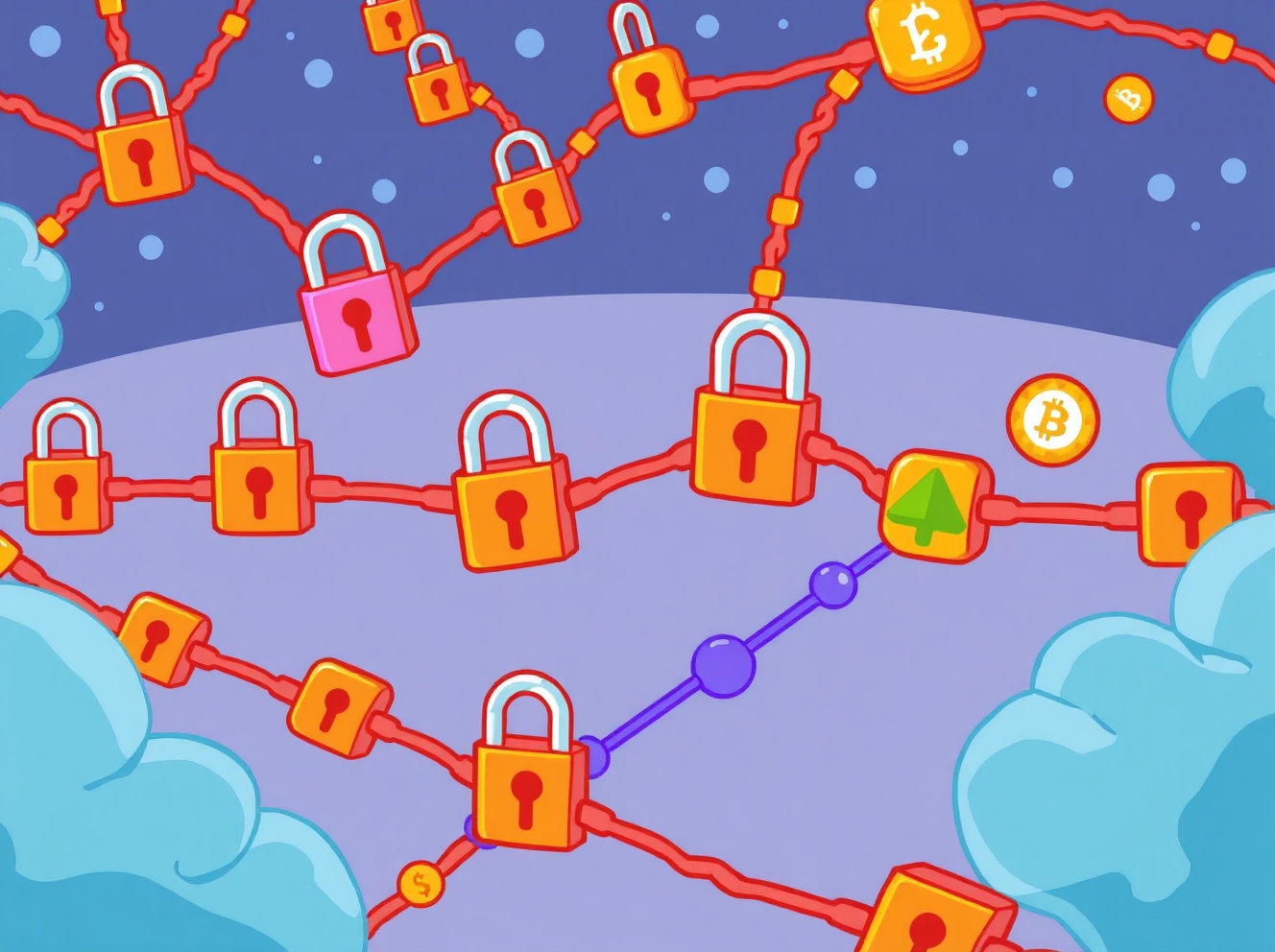Shocking Revelation: 16 Blockchains Can Freeze User Funds According to Bybit Analysis

Share:
BitcoinWorld
Shocking Revelation: 16 Blockchains Can Freeze User Funds According to Bybit Analysis
Did you know that some blockchains can actually freeze your cryptocurrency? A recent Bybit security analysis uncovered a startling truth about blockchain networks and their control over user assets. The research team examined 116 different blockchains and made a concerning discovery about fund control capabilities.
Which Blockchains Can Freeze User Funds?
The Bybit security research team identified 16 blockchains with the technical capability to restrict or freeze user funds. This finding challenges the common perception of complete decentralization in the crypto space. The analysis covered major networks that many investors use daily.
Among the identified networks are several well-known platforms:
- Aptos
- Sui
- BNB Chain
- VeChain
- Chiliz
- Viction
- XDC Network
- Heco Chain
How Do Blockchains Freeze User Funds?
Understanding how blockchains freeze user funds requires looking at their underlying architecture. Some networks incorporate centralized elements or administrative controls that enable fund restriction. These mechanisms can be activated under specific circumstances, such as regulatory requirements or security threats.
The capability varies between networks. Some can freeze individual wallets, while others might restrict specific tokens or smart contracts. This flexibility in control mechanisms represents a significant departure from Bitcoin’s original vision of complete financial sovereignty.
Why Does This Matter for Crypto Investors?
This revelation carries important implications for anyone involved in cryptocurrency. The ability of blockchains to freeze user funds directly impacts investment security and decentralization principles. Investors need to understand that not all networks offer the same level of asset protection.
When choosing where to store or transact digital assets, consider the network’s control mechanisms. Some blockchains prioritize regulatory compliance over absolute decentralization. This trade-off affects your financial sovereignty and asset security.
What Are the Alternatives?
Fortunately, many blockchains maintain true decentralization where no single entity can freeze funds. Networks like Bitcoin and Ethereum operate without central control points for asset freezing. However, even these networks face regulatory pressures that could potentially lead to changes in their operational models.
The key is research and due diligence. Before committing to any blockchain network, investigate its governance model and control mechanisms. Look for transparent documentation about administrative capabilities and emergency intervention protocols.
The Future of Blockchain Control
As regulatory frameworks evolve, the tension between decentralization and control will likely intensify. The discovery that blockchains can freeze user funds represents just one aspect of this ongoing struggle. The industry must balance innovation with compliance while preserving core blockchain values.
Moving forward, expect increased transparency about network capabilities. Projects may need to disclose their control mechanisms more clearly to maintain user trust. This transparency will help investors make informed decisions about where to place their digital assets.
Conclusion: Navigating the Complex Blockchain Landscape
The Bybit analysis serves as a crucial reminder that not all blockchains are created equal. The finding that 16 blockchains can freeze user funds underscores the importance of understanding network architectures before investing. True decentralization remains a spectrum rather than an absolute standard in today’s crypto ecosystem.
As investors, we must prioritize networks that align with our values regarding financial sovereignty and control. The ability to freeze assets represents a significant power that contradicts the fundamental principles of cryptocurrency for many enthusiasts. Choose wisely and stay informed about the networks you trust with your digital wealth.
Frequently Asked Questions
Can Bitcoin freeze user funds?
No, Bitcoin’s decentralized nature prevents any single entity from freezing user funds. The network operates without central control points.
Why would blockchains need to freeze funds?
Blockchains might freeze funds for regulatory compliance, security breaches, or legal requirements. Some networks build this capability for enterprise adoption.
How can I check if a blockchain can freeze funds?
Research the network’s whitepaper, governance model, and technical documentation. Look for mentions of administrative controls or emergency intervention capabilities.
Are decentralized exchanges affected by fund freezing?
Yes, if the underlying blockchain can freeze funds, assets on DEXs operating on that network could potentially be restricted.
What happens to frozen funds?
Frozen funds typically remain in the wallet but become untransferable. The duration and conditions for unfreezing vary by network and circumstance.
Can frozen funds be permanently lost?
While rare, permanently lost access is possible if freezing results from legal actions or network decisions. However, most freezes are temporary measures.
Found this information valuable? Help others stay informed by sharing this article on your social media platforms. The more people understand about blockchain capabilities, the better decisions we can all make in the crypto space.
To learn more about the latest cryptocurrency security trends, explore our article on key developments shaping blockchain technology and institutional adoption.
This post Shocking Revelation: 16 Blockchains Can Freeze User Funds According to Bybit Analysis first appeared on BitcoinWorld.
Shocking Revelation: 16 Blockchains Can Freeze User Funds According to Bybit Analysis

Share:
BitcoinWorld
Shocking Revelation: 16 Blockchains Can Freeze User Funds According to Bybit Analysis
Did you know that some blockchains can actually freeze your cryptocurrency? A recent Bybit security analysis uncovered a startling truth about blockchain networks and their control over user assets. The research team examined 116 different blockchains and made a concerning discovery about fund control capabilities.
Which Blockchains Can Freeze User Funds?
The Bybit security research team identified 16 blockchains with the technical capability to restrict or freeze user funds. This finding challenges the common perception of complete decentralization in the crypto space. The analysis covered major networks that many investors use daily.
Among the identified networks are several well-known platforms:
- Aptos
- Sui
- BNB Chain
- VeChain
- Chiliz
- Viction
- XDC Network
- Heco Chain
How Do Blockchains Freeze User Funds?
Understanding how blockchains freeze user funds requires looking at their underlying architecture. Some networks incorporate centralized elements or administrative controls that enable fund restriction. These mechanisms can be activated under specific circumstances, such as regulatory requirements or security threats.
The capability varies between networks. Some can freeze individual wallets, while others might restrict specific tokens or smart contracts. This flexibility in control mechanisms represents a significant departure from Bitcoin’s original vision of complete financial sovereignty.
Why Does This Matter for Crypto Investors?
This revelation carries important implications for anyone involved in cryptocurrency. The ability of blockchains to freeze user funds directly impacts investment security and decentralization principles. Investors need to understand that not all networks offer the same level of asset protection.
When choosing where to store or transact digital assets, consider the network’s control mechanisms. Some blockchains prioritize regulatory compliance over absolute decentralization. This trade-off affects your financial sovereignty and asset security.
What Are the Alternatives?
Fortunately, many blockchains maintain true decentralization where no single entity can freeze funds. Networks like Bitcoin and Ethereum operate without central control points for asset freezing. However, even these networks face regulatory pressures that could potentially lead to changes in their operational models.
The key is research and due diligence. Before committing to any blockchain network, investigate its governance model and control mechanisms. Look for transparent documentation about administrative capabilities and emergency intervention protocols.
The Future of Blockchain Control
As regulatory frameworks evolve, the tension between decentralization and control will likely intensify. The discovery that blockchains can freeze user funds represents just one aspect of this ongoing struggle. The industry must balance innovation with compliance while preserving core blockchain values.
Moving forward, expect increased transparency about network capabilities. Projects may need to disclose their control mechanisms more clearly to maintain user trust. This transparency will help investors make informed decisions about where to place their digital assets.
Conclusion: Navigating the Complex Blockchain Landscape
The Bybit analysis serves as a crucial reminder that not all blockchains are created equal. The finding that 16 blockchains can freeze user funds underscores the importance of understanding network architectures before investing. True decentralization remains a spectrum rather than an absolute standard in today’s crypto ecosystem.
As investors, we must prioritize networks that align with our values regarding financial sovereignty and control. The ability to freeze assets represents a significant power that contradicts the fundamental principles of cryptocurrency for many enthusiasts. Choose wisely and stay informed about the networks you trust with your digital wealth.
Frequently Asked Questions
Can Bitcoin freeze user funds?
No, Bitcoin’s decentralized nature prevents any single entity from freezing user funds. The network operates without central control points.
Why would blockchains need to freeze funds?
Blockchains might freeze funds for regulatory compliance, security breaches, or legal requirements. Some networks build this capability for enterprise adoption.
How can I check if a blockchain can freeze funds?
Research the network’s whitepaper, governance model, and technical documentation. Look for mentions of administrative controls or emergency intervention capabilities.
Are decentralized exchanges affected by fund freezing?
Yes, if the underlying blockchain can freeze funds, assets on DEXs operating on that network could potentially be restricted.
What happens to frozen funds?
Frozen funds typically remain in the wallet but become untransferable. The duration and conditions for unfreezing vary by network and circumstance.
Can frozen funds be permanently lost?
While rare, permanently lost access is possible if freezing results from legal actions or network decisions. However, most freezes are temporary measures.
Found this information valuable? Help others stay informed by sharing this article on your social media platforms. The more people understand about blockchain capabilities, the better decisions we can all make in the crypto space.
To learn more about the latest cryptocurrency security trends, explore our article on key developments shaping blockchain technology and institutional adoption.
This post Shocking Revelation: 16 Blockchains Can Freeze User Funds According to Bybit Analysis first appeared on BitcoinWorld.











